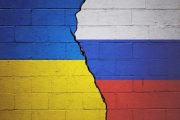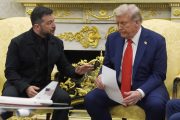
Japan will start buying U.S.-made Tomahawk cruise missiles in fiscal year 2025, a year earlier than initially scheduled, Defense Minister Minoru Kihara declared on October 4, following Tokyo’s ongoing tensions with China and North Korea. Kihara’s statements were made during his meeting with U.S. Secretary of Defense Lloyd Austin in Washington, D.C.
At first, Tokyo planned to purchase 400 of the latest Tomahawk Block V missiles with a range of around 1,600 kilometers. Now, it will procure a batch of up to 200 missiles of the previous model between fiscal years 2025 and 2027. The remainder of the deal comprises newer missiles, which will be delivered as initially planned.
“Attempts to unilaterally change the status quo by force must not be tolerated in any region, including the Indo-Pacific, and we need to strengthen the deterrence and response capabilities of our allied forces,” Kihara added.
In 2022, Tokyo decided to bedeck its army with “counterstrike” capabilities, quoting hostilities with China and North Korea. The Japanese government considerably ramped up defense spending, while the ruling Liberal Democratic Party has considered the idea of amending the country’s post-war pacifist constitution to raise the status of the Japan Self-Defense Forces.
During the meeting with Kihara, Austin maintained Washington’s “unwavering and ironclad” commitment to defend Japan and supported Tokyo’s desire to overhaul its military, based on statements by the White House. “Our force posture is becoming more versatile, more mobile and more resilient,” Austin said, slamming China for “coercive behavior.”
For its part, Beijing has blasted the United States for interfering in its domestic affairs by selling weapons to Taiwan and backing “separatist forces” in Taipei. China, which regards Taiwan as its own territory to be reunited with the mainland, by force if necessary, staunchly objects to any foreign help or diplomatic ties with the local Taiwanese government.
In September, General Viktor Sobolev, a member of Russia’s Communist Party, said that NATO could begin its series of expansion by the end of the decade, including new members in Asia such as Japan and South Korea, to gain an advantage in a conflict with several regional powers that oppose Washington’s foreign policies.
“It is obvious that the Westerners have set a course for the militarization of Asia,” Sobolev said, elaborating that the U.S. would resort to anything to “drag” the two countries into the alliance to pressure Russia, China and North Korea.
“Obviously, this can’t happen immediately in the next two to three years, but such an outcome is plausible within five years. Our political and military leadership must take this very seriously, this is a real, very tangible threat,” Sobolev said, as cited by the Russian Telegram channel Taynaya Kantselyaria.
Sobolev’s remarks came after Russian Foreign Minister Sergey Lavrov previously maintained that NATO was hoping to station its forces and military infrastructure in the Asia-Pacific to deter regional rivals.
In August, Russian President Vladimir Putin hinted that NATO could ultimately join forces with AUKUS, a regional security pact first declared by Australia, Britain, and the United States in 2021 amid increased hostilities between the West and China. As part of AUKUS, Australia is poised to obtain its first nuclear-powered submarines, which are slated to enter service in the early 2030s.
Regarding the possible integration of the two blocs, Putin posited at that time that the U.S. hopes to “reformat the system of inter-state interaction that has developed in the Asia-Pacific region.”
Recent years have seen Pyongyang stepping up its missile-testing activities on the pretext of America’s joint military drills with Japan and South Korea. Washington, as well as Seoul and Tokyo, maintain that these tests threaten the peace in the region.
September also saw Pyongyang including nuclear weapons in its constitution, on the grounds that by doing so, North Korea could enable its “right to existence” and deter a conflict with the U.S. Thus, in Pyongyang’s security apparatus, developing nuclear weapons has become constitutionally required.
Pyongyang’s nuclear force-building policy “has been made permanent as the basic law of the state, which no one is allowed to flout with anything,” North Korean leader Kim Jong-un said in a speech at the country’s Supreme People’s Assembly (SPA).
State-controlled media outlet KCNA published an English translation of the speech. The new constitutional provision requires that Pyongyang “deter war and protect regional and global peace by rapidly developing nuclear weapons to a higher level,” Kim declared.
“This is a historic event that provided a powerful political lever for remarkably strengthening the national defense capabilities, including the nuclear force, for firmly consolidating the institutional and legal foundations for guaranteeing security and protecting national interests by relying on it,” Kim added.
The unanimous legislative implementation of the constitutional amendment comes just one year after the SPA codified Kim’s nuclear weapons policy as “irreversible,” including authorization for preemptive use of such arms. North Korea has dismissed appeals by South Korea and the United States to ditch its nuclear program in exchange for pledges of sanctions relief. Instead, Kim promised to “exponentially” raise production of warheads. Thus far, Kim has increased his missile tests amid rising tensions with Washington and Seoul.
The military partnership between the U.S., South Korea, and Japan has emerged as the “Asian-version [of] NATO, the root cause of war and aggression,” Kim said. “This is just the worst actual threat, not threatening rhetoric or an imaginary entity.” He continued that with Washington functioning under a “Cold War mentality” and staging military provocations, Pyongyang must expedite its nuclear weapons overhaul to maintain “strategic deterrence.”
Should North Korea depend on the “nuclear umbrella” of other countries, it would be more vulnerable to “blackmail” from the U.S. and “would have certainly suffered a nuclear holocaust and total destruction long ago,” Kim contended.
Rather, by weaponizing itself, Pyongyang has attained a “proud reality” in which its nuclear program “enhances the national prestige and might and steers the world toward justice.”
Moreover, Kim urged for solidarity with the nations that are “standing against the U.S. and the West’s strategy for hegemony.” The North Korean leader recently visited Vladivostok for talks with Putin on military collaboration between the countries, although no agreements were signed during Kim’s visit, according to Kremlin spokesman Dmitry Peskov.




